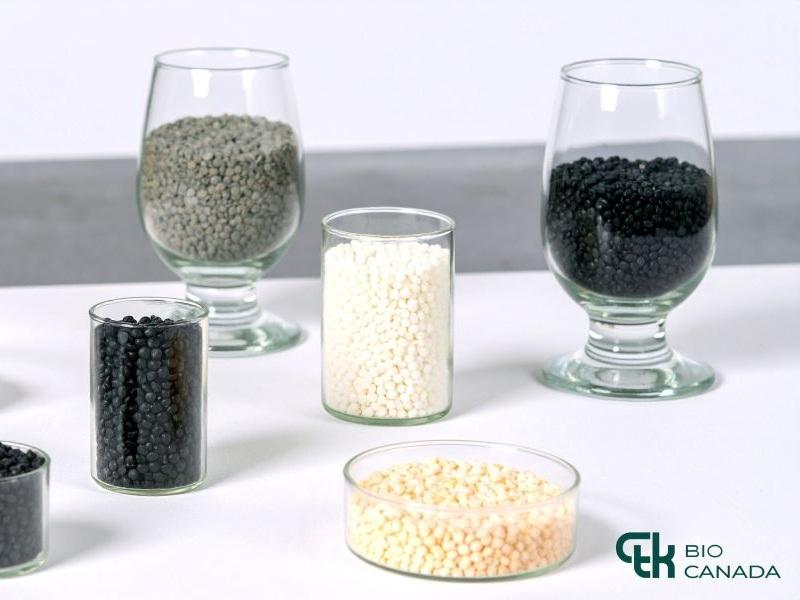
As manufacturers seek more sustainable alternatives to fossil fuel-based plastics, CTK Bio Canada is expanding its line of recyclable and biodegradable plastic resins, and has now also added an advisory platform.
A now-independent company based in Surrey, B.C., the firm is an offshoot of Korean manufacturer CTK Cosmetics. CTK Bio blends plastics with additives such as plant waste to produce a range of pellet resins that break down over time, are 100 per cent recyclable, or are partially mixed with plant material to lower the carbon impact.
CTK Bio has also developed a network of manufacturers across Canada and the U.S. that take its plastic feedstock to produce a wide range of products: cutlery, food and beverage packaging, films, bags, golf tees and more.
It's latest venture is an end-to-end platform for companies seeking help to move away from traditional plastics into more sustainable substitutes.
“I see us as more of a sustainable solutions platform, where businesses can come to us seeking for alternatives,” Daniel Shum, COO and co-founder of CTK Bio, said in an interview with Sustainable Biz Canada.
A 'crazy idea' that became a company
CTK Bio is the brainchild of JK Park, its co-founder and CEO, who wanted to find a means of upcycling plant waste into high-value materials. After cannabis was legalized in Canada in 2018, he spoke to businesses in the sector and learned that disposing of the discarded hemp was an issue that cost them money and time.
“JK had this crazy idea of going to them and saying, ‘Hey, what if you just ship us that waste for free, and then we’ll figure out how to turn that into something highly valuable,” Shum said.
CTK Cosmetics was intrigued enough to invest into CTK Bio. Today, CTK Bio produces the resins from its 11,000-square-foot factory in the Surrey neighbourhood of Cloverdale. It has the capacity to generate 2,000 tonnes of resins per year, in three main forms:
- bio- and petroleum-based resins that are 100 per cent compostable in natural conditions and degrade at least 20 per cent faster than the competition;
- recyclable resins made entirely of recycled content with no virgin plastic; and
- bio-content resins that are a blend of its recyclable resin with up to 50 per cent plant waste.
The bio-content resin is for CTK Bio’s price-sensitive clients, Shum said, who have been “happy with using traditional plastics,” want to transition out, "but they’re not ready to make that big jump yet.” The product is “more of a carbon footprint play,” he added.
CTK Bio says incorporating the bio-content resin can cut up to half of a product's carbon footprint.
The compostable resin is the most commonly adopted so far, Shum added.
Tariffs a 'blessing in disguise'
On the product side, CTK Bio ships its resins to its North American manufacturers who mould, extrude and blow the raw materials into common plastic and laminated paper items such as straws and tubes, forks and knives, cups and bags under CTK Bio’s label. Two of its exclusive manufacturing partners are right next door to its Cloverdale facility, Shum said.
While tariffs have shaken up U.S.-Canada trade, Shum sees it as a “blessing in disguise” for his company. As its products are made in North America, CTK Bio can benefit from the onshoring trend.
“Even though North American goods were originally more expensive, we now can compete with the products and goods made from Asia,” he said.
CTK Bio's end-to-end platform

Since a Canada-wide ban on the manufacturing, import and sale of fossil-fuel-based single-use plastic items was passed by the federal government (though it is being challenged in court), CTK Bio has seen interest in its products skyrocket, Shum said.
The Canadian government laid out a list of potential alternatives in light of the phase-out, which includes recyclable or plant-based materials. In light of this, research firm Mordor Intelligence projects the Canadian bioplastics market will register a compound annual growth rate of almost 14 per cent from 2025 to 2030.
To aid businesses in the change to alternatives, CTK Bio embarked on an advisory business line which it calls an end-to-end platform.
Unveiled earlier this month, CTK Bio assists clients who are unsure where to start on their journey. CTK Bio will help define what sustainability means to the client, guide them on material selection, and understand the end goal for the product the client is developing, Shum said.
“We just didn’t find (that expertise) in the market,” Shum explained. The company “can cater to all these different interests” including demand for recyclable materials or made-in-North America goods.
The platform expects to build a client base in the food and beverage and technology industries, as well as with CTK Bio’s investor CTK Cosmetics.
As CTK Bio puts less emphasis on single-use items, Shum said it is also developing solutions for longer-term, less commodity-like projects such as bottles, diapers, marine buoys, agricultural films and cosmetics.










